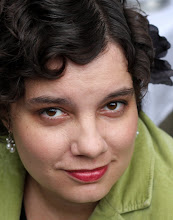From Brent's blog:
I tend to read a fair amount of news, and I pretty regularly read the New York Times and the Wall Street Journal. I've noticed that, after a decent interval, one of those newspapers will run a story that the other has already run. They're never completely the same, but they're pretty close. And I don't mean run-of-the-mill daily news, I mean the kind of feature stories that one would think ought to be unique.
I bring that up because this weekend the Journal ripped off a feature from Wired magazine. Both features offer a sort of debate between about whether the Internet is making us smarter (WSJ, Wired) or dumber (WSJ Wired). Nicolas Carr, whose new book is about how the Internet is making us shallow thinkers, is on the "dumber" side. For example, he says that studies show that the mere presence of links in an article degrades our ability to retain information--even if we don't actually click the links--because our brain is distracted by the need decide whether or not to click them (so, sorry about those links up there). On the "smarter" side is Clay Shirky (in the Wired article he's joined by Dan Pink) who's noticed that we spend a lot of time watching TV (surprise!). That TV time might be more productively spent, say, adding information to Wikipedia. For example, Shirky's Journal article cites a statistic that the total number of hours people have spent editing Wikipedia is about equal to the number of hours Americans spend watching TV ads over a weekend. (Makes the Wiki-geeks seem less geeky doesn't it?)
I bring these news stories up because they demonstrate a large theoretically debate going on about the promises and perils of the Internet and I recommend either feature, although the Journal articles are not free. But those article don't do what William Powers' Hamlet's Blackberry does: offer some practical thoughts about how we are all living today with interruptive technology. I wish everyone would read the book, especially the people who won't like it. For many of us, the constant mind-candy and threat of being always reachable is degrading our lives. Work never leaves us and we can develop the feelings of a "hunted mind." But we cannot blame just our employers, we spend our free time scratching at our smart-phones like crack(berry) addicts. I am, after all, typing this on my shiny new iPad.
Powers' book is great and simple but not simplistic. He reviews 7 philosophers from Plato to Seneca to Ben Franklin to Thoreau who lived in times of fast-paced technological change, and he pulls out practical wisdom from each. At the end of the book he details his family's habit of having an Internet Sabbath each weekend. No in-home Net access; they must walk to the library if they must get online. Powers finds this liberating and good for family togetherness. We plan to try it.
So I highly recommend that people read the book and spend some time thinking about how well we are integrating technology into our lives (and letting our employers have more of our time than we'd often like). What's funny is that I heard about this book in an interview on the Monocle weekly podcast (#59). And a few weeks later the interviewer (and founder of the Monocle) Tyler Brûlé wrote a column in the Financial Times about how he can't stand people who have out-of-office replies on their email. He thinks they must only do that because they hate their jobs and so they should quit and be entrepreneurs like him. (And he thinks they're the sort of people who wear sweatpants.). But not everyone wants to be connected all the time and I really wish that Mr. Brûlé would spend some more time pondering William Powers' excellent book.
6.12.2010
Subscribe to:
Post Comments (Atom)


1 comment:
ABC’s “Good Morning America” covers Hamlet’s BlackBerry
Posted on June 30, 2010
Claire Shipman
Good Morning America had a piece today about digitally addicted families and how to pull ourselves away from the screen. I was interviewed, talking about my family’s ritual of disconnected weekends – what we call the Internet Sabbath – and other aspects of the book.
At one point I mentioned Henry David Thoreau and they flashed a picture of him on the screen. Afterwards, an ABC producer emailed me that she’s pretty sure this was HDT’s debut on GMA. It only took 150 years!
Thoreau
At the end of the piece, correspondent Claire Shipman, speaking from what appeared to be her kitchen, said the Internet Sabbath sounded like just the thing for overconnected families, including her own:
“Do you have a problem? Are you missing important events? Do you miss your electronic gadgets long after you’ve put them away? You might need an Internet Sabbath. And I’ll tell you . . . doing this piece made me realize that our family certainly needs one.”
The text of the GMA piece, with a link to the “extended” video version (not quite the same as what aired) is here.
Post a Comment